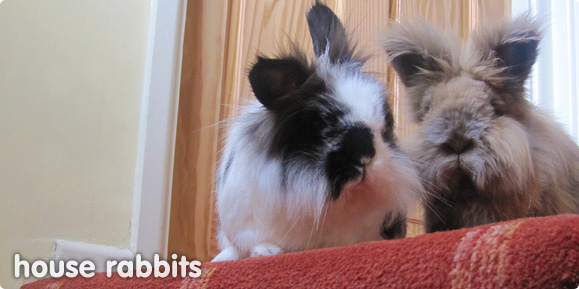House rabbits

More and more rabbits are being kept as house pets, and why not - cats and dogs live indoors too! Having your pet rabbits in the house makes it easier to interact with them and makes them more sociable, as well as easier for you to keep an eye on them for any changes in their health or behaviour. It also gives you peace of mind that they are safe from predators at night or when you are out. House bunnies are fun to watch and play with, the more confident they get you will see them exploring or jumping up onto your lap for a treat, or lying stretched out on the floor sleeping or grooming each other.
But don't rabbits smell bad?
No they don't! Rabbits themselves are very clean animals with odourless fur and they fastidiously groom themselves all day. Only their urine smells so as long as you keep their living area clean (spot clean every few days and a full clean-out once a week) you shouldn't have a problem. You shouldn't be able to smell their poo either; they do 2 types of poos - one type is dry and well-formed in little balls - this doesn't smell. The other type looks like blackberries and these smell quite offensive! Although smelly they are nutritious and are re-eaten by your bunny straightaway so you shouldn't really see these. If you see a lot of them, or your rabbit has them stuck to his bum, or he has diarrhea, then you need to consult your vet as it could be a sign of a parasite, arthritis, obesity, or too rich a diet. See The Importance of Poo for more info.
Will my rabbits poo and wee everywhere in the house?
Rabbits can be litter trained, and once neutered there should be very few 'accidents' in the house. If your rabbits are not spayed / neutered then they will urinate or spray to mark their territory. As bunnies run around they will sometimes do a few droppings here and there, but these are dry and easily swept up. If they do occasionally have an accident you must NEVER shout or hit them as they won't understand that this means they've done something wrong; it will just scare or hurt them. Stick to saying 'No' firmly if anything.
Litter Trays
Rabbits will learn to use a litter tray, and if neutered will be even better at doing so! Line a cat litter tray with newspaper then a layer of rabbit-safe litter such as Megazorb. Then a layer of hay on top as rabbits like to nibble on hay while they're on the toilet! Don't use wood shavings as they're bad for rabbits' sensitive respiratory systems. Put the tray in the spot your rabbit has chosen as a toilet and they will learn to use the tray instead. If you have to mop up some urine or poos, put the tissue into the tray so they make the connection that that's where poo and urine belongs!
Will they chew the furniture?
Just as cats may claw the furniture and dogs may chew the remote control, rabbits will by nature chew and dig where possible so ensure you rabbit-proof your home and remove potential hazards. To your bunny, cables = tree roots, carpet = soil and grass, skirting boards = tree bark, house plants = food, and it's all asking to be eaten or dug up! To avoid this, cover electric cables, keep house plants out of reach and collect up any dropped leaves or petals. Provide your rabbits with safe and suitable materials to gnaw on and dig in, and toys and hay to keep them busy so they are less likely to choose the antique furniture! See here for info on bunny-proofing.
Will I need to have a hutch indoors?!
If your bunny will be kept indoors then you don't need to buy a hutch; there are other options available. They will still need somewhere secure to call their own; this can be a fenced off area of the room or a large cage/dog crate, or even their own room! They will still need lots of space, if not the whole house, to roam as well as their own private area. Think of their indoor housing as a base for them to return to (for security, if scared, and for bedtime). See our housing gallery for some ideas.
Keep them entertained
Bunnies like company, so if they live with you indoors it's easier for them to avoid them getting bored as they are able to constantly interact with the family. They will also love the freedom and hiding places (such as under the sofa!) In your rabbits' own area you should provide a litter tray, toys and materials they can chew, and access to hay and water.
Walkies in the fresh air
Just like you walk your dog, house rabbits should also have regular access to an outside area where they can graze, if possible. Rabbits need 6+ hours free range time per day, so having them loose in the house makes it a lot easier to do this.
